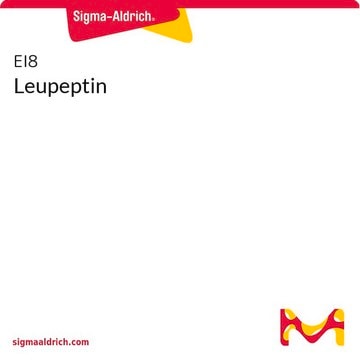205531
CA-074 Me
≥98% (HPLC), solid, Cathepsin B inhibitor, Calbiochem®
Szinonimák:
CA-074 Me, Cathepsin B Inhibitor IV, [L-3- trans-(Propylcarbamoyl)oxirane-2-carbonyl]-L-isoleucyl-L-proline Methyl Ester
About This Item
Javasolt termékek
product name
CA-074 Me, CA-074 Me, CAS 147859-80-1, is a cell-permeable analog of CA-074 that acts as an irreversible inhibitor of intracellular cathepsin B.
Minőségi szint
Teszt
≥98% (HPLC)
form
solid
gyártó/kereskedő neve
Calbiochem®
tárolási körülmény
OK to freeze
szín
white
oldhatóság
DMSO: 10 mg/mL
kiszállítva
ambient
tárolási hőmérséklet
−20°C
Általános leírás
Biokémiai/fiziológiai hatások
cathepsin B
Figyelmeztetés
Feloldás
Egyéb megjegyzések
Authier, F., et al. 1999. J. Biol. Chem.274, 33723.
Hill, P.A., et al. 1994. J. Cell Biochem. 56, 118.
Buttle, D.J., et al. 1992. Arch. Biochem. Biophys. 299, 377.
Jogi információk
Tárolási osztály kódja
11 - Combustible Solids
WGK
WGK 3
Lobbanási pont (F)
Not applicable
Lobbanási pont (C)
Not applicable
Analitikai tanúsítványok (COA)
Analitikai tanúsítványok (COA) keresése a termék sarzs-/tételszámának megadásával. A sarzs- és tételszámok a termék címkéjén találhatók, a „Lot” vagy „Batch” szavak után.
Már rendelkezik ezzel a termékkel?
Az Ön által nemrégiben megvásárolt termékekre vonatkozó dokumentumokat a Dokumentumtárban találja.
Tudóscsoportunk valamennyi kutatási területen rendelkezik tapasztalattal, beleértve az élettudományt, az anyagtudományt, a kémiai szintézist, a kromatográfiát, az analitikát és még sok más területet.
Lépjen kapcsolatba a szaktanácsadással








